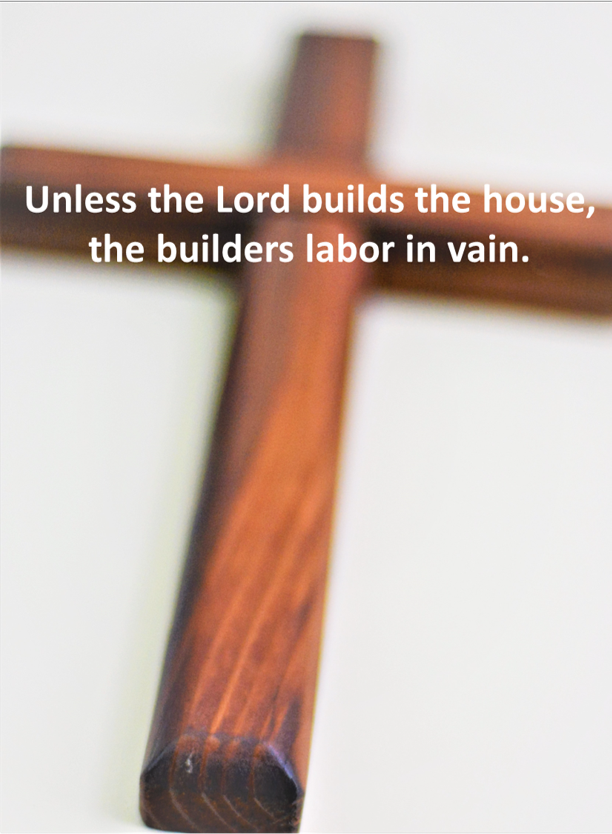Good morning, and happy and blessed Thanksgiving!
Greetings in the name of the Father, the Son, and the Holy Spirit.
“Keep this Book of the Law always on your lips; meditate on it day and night, so that you may be careful to do everything written in it. Then you will be prosperous and successful.” (Joshua 1:8)

In the heart of the Sinai Desert, amidst the raw and rugged landscape, a story of divine design and human craftsmanship unfolds. Exodus 36 narrates an extraordinary act of faithfulness – the construction of the Tabernacle. This narrative isn’t merely about building a structure; it’s about a community diligently following a divine blueprint. As we explore this passage, we’re invited to reflect on the significance of adherence to God’s plans in our lives.
The Tabernacle was more than a physical space; it was a visual sermon on the importance of obedience to God. Each stitch in the fabric, each carving in the wood, each placement of gold was a testament to the Israelites’ commitment to following God’s precise instructions. Today, this story beckons us to consider our own lives. Are we aligning our actions, decisions, and desires with God’s blueprint for us?
As we delve into Exodus 36, let’s view it not just as an ancient text but as a mirror reflecting our own walk with God. It challenges us to ask: How closely do we adhere to the divine plans laid out for us in Scripture? How does our attention to God’s details manifest in our daily living? Join me as we explore the rich lessons embedded in this chapter, understanding that in every command of God, there lies wisdom, blessing, and an opportunity for deeper communion with Him.

The Precision of Obedience
“See that you make them after the pattern for them, which is being shown you on the mountain.” (Exodus 25:40)
In Exodus 36, we encounter a remarkable testament to precision and obedience in the construction of the Tabernacle. This account transcends a mere historical narrative; it embodies an act of profound reverence and commitment to God’s directives. The craftsmen involved in this divine endeavor adhered strictly to the blueprint provided by God. Their work was not a display of rigid legalism, but rather, it was an expression of deep respect for God’s will and a desire to honor Him through their craftsmanship.
The attention to detail in the Tabernacle’s construction invites us to introspect the nature of our obedience to God. Are we treating His commands as mere suggestions, or are we striving to follow them with utmost care and precision? This is a question that challenges our daily walk with God. In the New Testament, James 1:22 reinforces this thought, urging us to be “doers of the word, and not hearers only,” thereby emphasizing that our obedience is a form of worship and a testament to our love for God.
However, living in obedience to God is not always a straightforward path. It often pushes us beyond our comfort zones, calling for sacrifices and a deep trust in God’s wisdom. The builders of the Tabernacle exemplified this as they meticulously followed God’s instructions, despite the complexity of the task. Their obedience was a journey of faith, trusting in God’s vision even when it surpassed their own understanding.
The precision in the construction of the Tabernacle also highlights the importance of each detail in God’s plan. The craftsmen’s work – from the weaving of the fabric to the crafting of the Ark – was done with a conscious awareness that every aspect of their work was part of a greater divine purpose. This mirrors the Apostle Paul’s words in 1 Corinthians 14:33, “For God is not a God of disorder but of peace,” reminding us that every aspect of our lives, when aligned with God’s will, contributes to His divine order.
Furthermore, the construction of the Tabernacle was a collective endeavor. It was not just the work of a few but the combined effort of the entire community. Each person, contributing their skills and resources, played a vital part in bringing the vision to life. This collective obedience is a powerful example for the church today, demonstrating how unity in following God’s commands can lead to the manifestation of His presence in our midst.
This narrative also prompts us to examine our motivations for obedience. Are we obeying God’s commands merely out of obligation, or are we driven by a genuine love for Him and a desire to see His will done on earth? As we contemplate this, we are reminded that our obedience is not just about following rules; it is about cultivating a relationship with God, where our actions reflect our devotion to Him.
As we transition from contemplating the precision of obedience in building the Tabernacle to considering the blessings that flow from adherence to God’s plans, let us carry with us the understanding that our precise obedience is not only a reflection of our faith but a foundation for experiencing God’s blessings in our lives. The story of the Tabernacle’s construction sets the stage for recognizing how closely aligning our lives with God’s will can lead to a deeper, more meaningful relationship with Him.

The Blessing in Following God’s Plan
“And Moses did according to all that the LORD commanded him, so he did.” (Exodus 40:16)
The second significant lesson from Exodus 36 is the abundant blessing that emanates from adhering to God’s instructions. When the Israelites meticulously followed the divine blueprint for the Tabernacle, they facilitated a space where God’s presence was palpably felt among them. This was not merely a consequence of their labor but a direct result of their obedience to God’s commands.
This principle of obedience leading to blessing extends far beyond the context of the Tabernacle. It is a timeless truth that resonates profoundly in our lives today. Aligning our lives with God’s will, as Jesus teaches in John 15:10, “If you keep my commandments, you will abide in my love,” enables us to experience His presence and favor in a tangible way. Obedience fosters an intimate relationship with God, wherein His guidance and love become integral parts of our daily experience.
The blessings derived from obedience are not limited to individual gain. They have a far-reaching impact, extending to our families, communities, and even entire congregations. When we collectively strive to follow God’s will, we create an environment where His presence is evident, and His power is manifest. As Psalm 133:1 beautifully states, “How good and pleasant it is when God’s people live together in unity!” This unity in obedience cultivates a fertile ground for God’s blessings to flourish.
Moreover, the story of the Tabernacle’s construction and the blessings that followed demonstrate the principle of collective obedience. Each member of the Israelite community played a role, contributing their skills and resources towards the fulfillment of God’s command. This communal effort resulted not only in the construction of a sacred dwelling place for God but also in a stronger, more unified community, blessed by God’s approving presence.
The concept of blessings flowing from obedience is also seen in the New Testament. In Matthew 7:24-25, Jesus says, “Everyone who hears these words of mine and puts them into practice is like a wise man who built his house on the rock. The rain came down, the streams rose, and the winds blew and beat against that house; yet it did not fall, because it had its foundation on the rock.” This metaphor illustrates that when we build our lives on the foundation of God’s commands, we are blessed with stability, strength, and resilience, regardless of life’s challenges.
In our personal lives, following God’s plan means making choices that align with His teachings and values. It involves applying His wisdom in our relationships, our work, and even in our leisure. This obedience is not always easy; it often requires sacrifice and a departure from the prevailing norms of society. However, as we align our actions with God’s will, we experience His blessings in various forms – peace, joy, and a sense of purpose and fulfillment.
This topic naturally leads us to consider how the principle of following God’s blueprint is relevant in our modern lives. As we transition to the next topic, let us reflect on how the ancient wisdom of the Tabernacle’s construction can guide us in applying God’s plan in the complexities of our contemporary world. The blessings of obedience, as demonstrated in the construction of the Tabernacle, are not confined to the past; they are available to us today as we align our lives with God’s perfect will.
Applying God’s Blueprint in Modern Life
“And let them make me a sanctuary, that I may dwell in their midst.” (Exodus 25:8)
The final aspect of our exploration in Exodus 36 is understanding how the principle of following God’s blueprint applies to our contemporary lives. In a world often characterized by rapid change and a high value placed on innovation and creativity, the concept of adhering to a prescribed divine plan might seem antiquated. Yet, the construction of the Tabernacle offers timeless wisdom, reminding us that there is profound understanding and blessing in following God’s designs.
Applying God’s blueprint in today’s context means integrating His teachings into every facet of our lives. It involves aligning our personal ethics, our relationships, our professional endeavors, and even our leisure activities with the principles outlined in Scripture. This application is not just about adhering to a set of rules; it’s about embodying a way of life that reflects God’s character and values. As Romans 12:2 urges, “Do not conform to the pattern of this world, but be transformed by the renewing of your mind. Then you will be able to test and approve what God’s will is—his good, pleasing and perfect will.” This transformation is a journey of aligning our lives more closely with God’s will.
In practical terms, living according to God’s blueprint can manifest in various ways. In our business dealings, it means operating with integrity and fairness. In our families, it involves nurturing relationships that reflect God’s love and grace. Within our churches, it calls for service and ministry that align with biblical teachings. Every decision, from the significant to the mundane, becomes an opportunity to demonstrate our commitment to God’s plan.
Following God’s blueprint also means recognizing and embracing the unique roles we each play in His grand design. Just as Bezalel and Oholiab had specific tasks in the construction of the Tabernacle, each of us has been endowed with unique gifts and callings. Ephesians 2:10 affirms this, stating, “For we are God’s handiwork, created in Christ Jesus to do good works, which God prepared in advance for us to do.” Our individual talents and abilities are not coincidental; they are divinely appointed for specific purposes in God’s kingdom.
Moreover, adhering to God’s blueprint in our lives requires discernment and wisdom, particularly in a world that often offers conflicting messages about success and fulfillment. It involves making choices that may not always align with societal norms but are in keeping with God’s Word. This discernment is beautifully encapsulated in Proverbs 3:5-6, “Trust in the Lord with all your heart and lean not on your own understanding; in all your ways submit to him, and he will make your paths straight.”
The relevance of the Tabernacle’s construction extends beyond its historical and cultural context; it serves as a metaphor for our spiritual journey in the modern world. It challenges us to examine whether our lives are truly reflective of God’s blueprint. Are we building our personal “tabernacles” – our lives, homes, and communities – in accordance with God’s instructions?
As we wrap up this exploration, let us consider the ways in which we can more faithfully apply God’s blueprint to our lives. May we find the courage and conviction to align our choices with His Word, knowing that in doing so, we create spaces in our lives for His presence to dwell. In our obedience to His design, we find true fulfillment and purpose, building a life that not only honors God but also brings His transformative power into our world.
Conclusion & Life Application
In conclusion, the construction of the Tabernacle in Exodus 36 stands as a powerful metaphor for our spiritual journey. This historical account, rich with lessons of obedience, dedication, and divine guidance, transcends time, offering us invaluable insights for our modern lives. It teaches us about the importance of precise obedience, the profound blessings that flow from following God’s plan, and the enduring relevance of this ancient blueprint in our contemporary world.
As we reflect on the construction of the Tabernacle, we are reminded of the meticulous care and unwavering dedication required to bring God’s vision to fruition. This level of commitment invites us to consider how we approach our relationship with God. Are we as diligent in following His instructions for our lives as the Israelites were in building the Tabernacle? The story encourages us to examine our daily actions, decisions, and priorities, urging us to align them with God’s will as revealed in Scripture.
Let us strive to be individuals and communities who meticulously follow God’s instructions. May our decisions, big and small, be guided by His Word. Let our churches and homes become places where God’s presence is tangibly manifested, not just in our worship but also in our everyday interactions and activities.
The call to follow God’s plan is fundamentally a call to trust in His infinite wisdom and love. It is an invitation to engage in a divine partnership, where our obedience is met with His unfailing guidance and provision. As we embark on this journey, let us do so with confidence, knowing that we are building our lives on the most secure foundation—the unchanging Word of God.
May our lives reflect the beauty and purpose of the Tabernacle—a beautiful, purposeful, and holy space where God’s presence dwells. As we apply these timeless lessons, let us create lives that are rich in obedience, abundant in blessing, and reflective of God’s glory. In doing so, we not only honor God but also become beacons of His light and love in a world that desperately needs it as Jesus Christ, His Only Begotten Son, did for God and for us. Amen.

“Unless the Lord builds the house, the builders labor in vain. Unless the Lord watches over the city, the guards stand watch in vain.” (Psalm 127:1)
